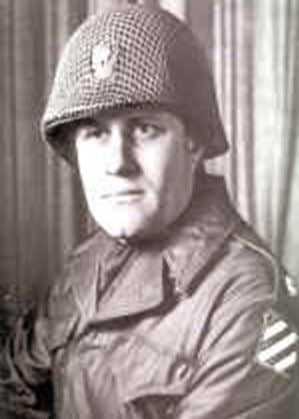- Colonel
- WW II
Biography
Colonel Kenneth B. Potter was a native of Cranston, Rhode Island and a 1929 graduate of Cranston High School. He entered Rhode Island State College (now the University of Rhode Island) in the fall of 1929 and enrolled in the Army ROTC program. While at URI, Ken was the captain of the football and baseball teams and a member of Theta Chi Fraternity. He was elected into the University of Rhode Island Athletic Hall of Fame. In 1933, Ken graduated from URI with a Bachelor of Science Degree in Chemical Engineering and was commissioned as a Second Lieutenant of Infantry.
He immediately entered into active duty with the Infantry and attended the U.S. Army’s Infantry Officer Basic School at Fort Benning, Georgia. Colonel Potter’s army career is highlighted by his service as an infantry officer in the European Theater during World War II. As an infantry battalion commander, he was the recipient of the Silver Star medal with four oak leaf clusters and was twice awarded the French Croix de Guerre – once personally from French General Charles De Gaulle.
In 1949, Lieutenant Colonel Kenneth Potter was awarded his second Distinguished Service Cross for extraordinary heroism while leading his unit in action at Heroldsberg, Germany on 14 April 1945, at which time he captured 124 Germans and killed nine more with an enemy weapon he had picked up off the ground. Though wounded twice, he was never out of action during the German campaign and commanded the 1st Battalion, 15th Infantry Regiment, 3d Division, 7th Army-Europe for the entire European Campaign.
Colonel Potter commanded Lieutenant Audie Murphy, the most highly decorated soldier of World War II, as an infantryman under his leadership in the 3d Division. He was in part responsible for recommending Lieutenant Murphy for his battlefield commission and the Congressional Medal of Honor. Colonel Potter and Lieutenant Murphy were lasting friends; and Colonel Potter gave the eulogy at Lieutenant Audie Murphy’s funeral, following his death in a tragic airplane crash.
Colonel Potter’s awards include the Combat Infantry Badge, Distinguished Service Cross with one Oak Leaf Cluster, Silver Star with four Oak Leaf Clusters, Bronze Star, Purple Heart with one Oak Leaf Cluster, Army Commendation Medal with one Oak Leaf Cluster, Presidential Unit Citation, European-African-Middle Eastern Campaign Medal and two French Croix de Guerre
Following the war, Colonel Potter returned to Washington D.C. where he commanded the Army’s Separation Center at Fort Myer, Virginia. Subsequently, Colonel Potter worked with Military Intelligence at the Pentagon.
Once retired from the military, he was a teacher of math and science at Flint Hill Academy, Fort Hunt and West Springfield High Schools in Fairfax County, Virginia. Colonel Potter lived his entire life serving others and his battlefield heroism is in keeping with the finest traditions of the military and reflects great credit upon himself, his family and the University of Rhode Island.
Colonel Kenneth B. Potter died on 15 September 1995 and was buried with full military honors in Arlington National Cemetery, Arlington, Virginia.
Education
1933

